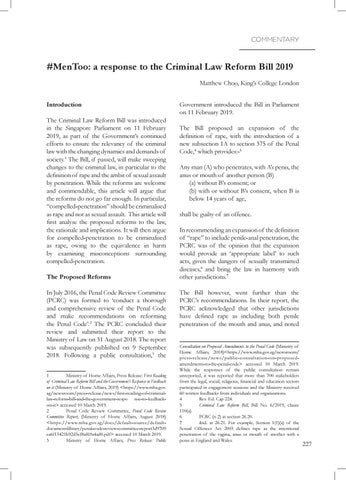COMMENTARY
#MenToo: a response to the Criminal Law Reform Bill 2019 Matthew Choo, King’s College London Introduction The Criminal Law Reform Bill was introduced in the Singapore Parliament on 11 February 2019, as part of the Government’s continued efforts to ensure the relevancy of the criminal law with the changing dynamics and demands of society.1 The Bill, if passed, will make sweeping changes to the criminal law, in particular to the definition of rape and the ambit of sexual assault by penetration. While the reforms are welcome and commendable, this article will argue that the reforms do not go far enough. In particular, “compelled-penetration” should be criminalised as rape and not as sexual assault. This article will first analyse the proposed reforms to the law, the rationale and implications. It will then argue for compelled-penetration to be criminalised as rape, owing to the equivalence in harm by examining misconceptions surrounding compelled-penetration. The Proposed Reforms In July 2016, the Penal Code Review Committee (PCRC) was formed to ‘conduct a thorough and comprehensive review of the Penal Code and make recommendations on reforming the Penal Code’.2 The PCRC concluded their review and submitted their report to the Ministry of Law on 31 August 2018. The report was subsequently published on 9 September 2018. Following a public consultation,3 the 1 Ministry of Home Affairs, Press Release: First Reading of Criminal Law Reform Bill and the Government’s Response to Feedback on it (Ministry of Home Affairs, 2019) <https://www.mha.gov. sg/newsroom/press-release/news/first-reading-of-criminallaw-reform-bill-and-the-government-respo nse-to-feedbackon-it> accessed 10 March 2019. 2 Penal Code Review Committee, Penal Code Review Committee Report, (Ministry of Home Affairs, August 2018) <https://www.mha.gov.sg/docs/default-source/defaultdocument-library/penal-code-review-committee-report3d9709 ea6f13421b92d3ef8af69a4ad0.pdf> accessed 10 March 2019. 3 Ministry of Home Affairs, Press Release: Public
Government introduced the Bill in Parliament on 11 February 2019. The Bill proposed an expansion of the definition of rape, with the introduction of a new subsection 1A to section 375 of the Penal Code,4 which provides:-5 Any man (A) who penetrates, with A’s penis, the anus or mouth of another person (B) (a) without B’s consent; or (b) with or without B’s consent, when B is below 14 years of age, shall be guilty of an offence. In recommending an expansion of the definition of “rape” to include penile-anal penetration, the PCRC was of the opinion that the expansion would provide an ‘appropriate label’ to such acts, given the dangers of sexually transmitted diseases,6 and bring the law in harmony with other jurisdictions.7 The Bill however, went further than the PCRC’s recommendations. In their report, the PCRC acknowledged that other jurisdictions have defined rape as including both penile penetration of the mouth and anus, and noted Consultation on Proposed Amendments to the Penal Code (Ministry of Home Affairs, 2018)<https://www.mha.gov.sg/newsroom/ press-release/news/public-consultation-on-proposedamendments-to-the-penal-code> accessed 10 March 2019. While the responses of the public consultation remain unreported, it was reported that more than 700 stakeholders from the legal, social, religious, financial and education sectors participated in engagement sessions and the Ministry received 60 written feedbacks from individuals and organisations. 4 Rev. Ed. Cap 224. 5 Criminal Law Reform Bill, Bill No. 6/2019, clause 110(a). 6 PCRC (n 2) at section 26.20. 7 ibid. at 26.21. For example, Section 1(1)(a) of the Sexual Offences Act 2003 defines rape as the intentional penetration of the vagina, anus or mouth of another with a penis in England and Wales.
227
